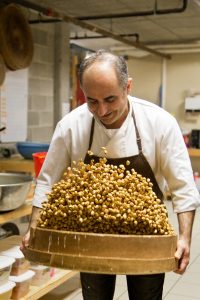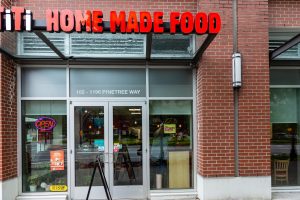By Joanne Sasvari
When the hyacinths bloom and the scent of saffron fills the air, it’s time for one of the most delicious celebrations of the year: Nowruz, sometimes called Persian New Year.
Nowruz, which literally means “new day,” is a time of renewal, of harmony with nature, of families coming together, a time of peace, reconciliation and neighbourliness, a reminder that every new day is a chance for a fresh start. It is also a time to feast and have fun.
Festivities begin at the vernal equinox, the moment that marks the first day of spring—which in 2021 is 2:37 a.m. PT on Saturday, March 20—then last for 13 days.
More than 300 million people around the world celebrate Nowruz. One of those places is Coquitlam, with its large Iranian population, many of whom operate businesses such as bakeries, groceries and restaurants that will be doing brisk trade over the coming days.
History
Nowruz began as a tradition of Zoroastrianism, an ancient Persian religion, at least 3,000 years ago. But today it is celebrated by people of many faiths in many places (including Kurdish people, Parsis of India, and people of Islamic, Bahai, Zoroastrian, and other faiths), and these days is largely secular.
Over the centuries, Nowruz picked up different social, religious and cultural influences and traditions as it spread from Iran to Afghanistan, parts of Iraq, Turkey and Syria, throughout Central Asia, and among the worldwide Persian diaspora.
In 2009, UNESCO included Nowruz in its Representative List of Intangible Cultural Heritage of Humanity as a cultural tradition observed by numerous peoples. And, although the holiday has been spelled Navroz, Norouz, Norooz, Nauruz, the Encyclopaedia Iranica and the international community prefer Nowruz.
Ultimately, Nowruz is a springtime celebration whose activities symbolise rebirth and links with nature, and has been described by the 11th-century Persian astronomer and poet Omar Khayyam as “the renewal of the world. ”
Traditions
Nowruz traditions vary from country to country and family to family, but a few things remain the same.
Before the arrival of Nowruz, people prepare by spring cleaning or “shaking” their homes and buying new clothes and flowers, such as tulips and hyacinths. Families visit each other, and hosts offer their visitors tea and pastries, cookies, fresh and dried fruits and mixed nuts or other snacks.
In some places, street singers known as Haji Firooz welcome Nowruz and customs can include jumping over bonfires or setting off firecrackers while chanting. Children may bang on spoons and knock on neighbours’ doors to receive sweets.
But the most significant is the tradition of the “haft seen” table. At the exact moment of the equinox, families gather to celebrate the new year with the seven Ss, seven items that start with the Persian letter “seen” and symbolize prosperity, health, productivity and happiness.
They can include: sumac (the colour of sunrise), sombol (hyacinths), sekeh (coins, which represent prosperity), sabzeh (greens), senjed (a dried berry that represents love) and samanu (a sweet pudding that symbolizes justice), sin (apples, for beauty); serekh (vinegar, for the wisdom of age). The table can also feature candles, mirrors, painted eggs, goldfish and a book of wisdom.
Foodstuffs
Following the vernal equinox are 13 days of visiting friends and family (though that will be limited in 2021 because of the ongoing pandemic) and, of course, feasting. Traditional foods can include those made with plenty of fresh green herbs such as sabzi polo mahi (herbed rice with fish), kuku sabzi (frittata with fresh herbs) and ash resteh (a thick green soup), as well as sweets such as baklava, chickpea cookies and ajeel (dried berries and raisins)
After 13 days, the festivities end with Sizdeh Be Dar, throwing sprouted greens into a river to get rid of bad luck.
Whether you celebrate or not, Nowruz Mubarak! And may the new year bring good fortune.
Where to enjoy Persian foods in Coquitlam
Ayoubs Coquitlam
Back in Tehran, Ayoub Hosseini started a roasted nut shop, one of many that dot the Iranian capital. He brought those skills to Canada and, in 2009, he and his son Amir opened their first location in North Vancouver. They have since expanded to five locations, include this one in Coquitlam, where they sell roasted nuts, dried fruits, saffron and snack mixes, sourcing ingredients from more than 20 countries and displaying them in beautiful chandelier-filled spaces.

Minoo Bakery
This classic Persian bakery, located on Glen Drive near Coquitlam Centre, is filled with cookies, cakes and other sweet treats. Expect to find traditional baklava and other nut-filled, vanilla-scented and honey-soaked sweets. Among the favourites are sohan (a saffron brittle), nargili (coconut macaroons) and naan gerdooee (walnut cookies).
Urban Gate Specialty Market and Takeout
This well-stocked, premium specialty market offers everything from fresh organic produce to deli meats and a full butcher shop. It also features a Persian bakery that sells everything from baklava to zoolbia (a deep-fried, sugar-soaked fritter) to custom cakes, as well as a takeout section offering traditional favourites such as koobideh (skewers of ground meat), barg (marinated sirloin steak) and jujeh (lemon-and-saffron-scented chicken).
This family-run Persian restaurant on Pinetree Way offers a huge selection of traditional dishes including an abundance of kebabs. The friendly, helpful staff, led by owner Ti Ti, are always happy to guide newcomers through Persian cuisine.

Cazba Express (Coquitlam Centre)
There are now four locations of this popular Iranian eatery across the Lower Mainland, known for healthy but flavourful dishes built around the traditional ingredients of fresh herbs, vegetables and rice along with meat, lamb, chicken or fish. Expect the usual kebabs as well as dishes such as tahchin (saffron rice with chicken breast) and ghormeh sabzi stew (beef, kidney beans and fresh herbs).
Sahand Bakery and Kebab Hut
While Sahand has a good selection of all the traditional favourites like kebabs, spreads and other dishes, it’s the bread that really stands out. The famous sangak, a leavened flat bread, comes in vast sheets and is made fresh every morning. If you order early enough, you can even customize to taste.
Torta Persian Cuisine / Catering Stars
This casual Persian restaurant serves breakfast, brunch, lunch and dinner, and also offers catering options. Check out the vegetarian and halal options, as well as the special Persian pastas and desserts.
Pasargad
An elegant full-service restaurant that offers traditional Persian cuisine, refined for a modern palate. Expect kebabs of fine meats like lamb tenderloin or marinated chicken breast, as well as succulent sweet and savoury stews including chicken with ground walnuts and pomegranate syrup, or fish filet in tomatoes and spices, as well as all the classic appetizers and sides.
Papa’s Shish Kabab
Just as it sits on the border of Burnaby and Coquitlam, this contemporary, family-oriented restaurant also straddles the border between Persian and Greek. It offers the traditional Persian kebabs and stews as well as Greek souvlaki and appetizers. Expect all the usual favourites as well as new dishes like the salmon kebab or deep-fried trout.
Did we miss your favourite? Tell us about it! Email tourism@coquitlam.ca to be added to the list.
